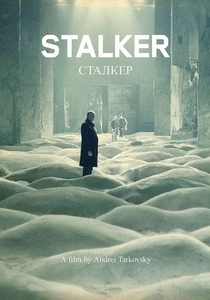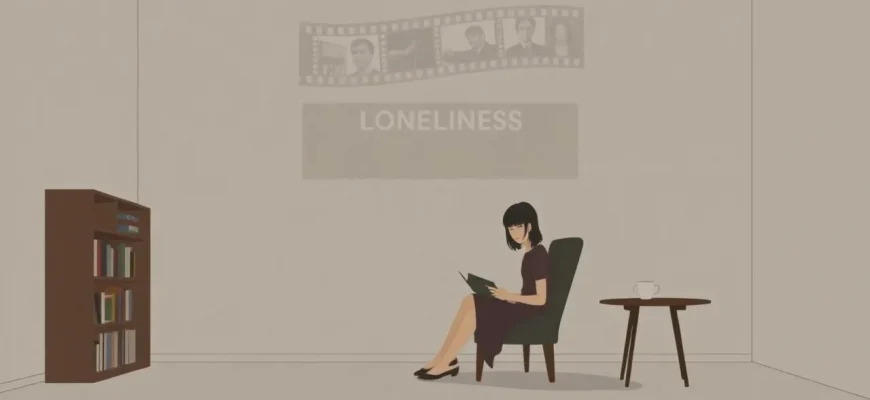Soviet cinema has always been a treasure trove of deep, introspective storytelling, often exploring themes of solitude and isolation. This curated list of 10 Soviet films delves into the nuanced portrayal of loneliness, offering viewers a poignant look at human emotions through the lens of Soviet filmmakers. Each film in this collection not only captures the essence of loneliness but also provides a window into the cultural and historical context of the Soviet Union, making it a must-watch for cinephiles and those interested in the human condition.

Stalker (1979)
Description: In this philosophical sci-fi, a guide known as the Stalker leads two men into a mysterious Zone where their innermost desires can be fulfilled, highlighting their existential loneliness and the search for meaning.
Fact: The film was shot in Estonia, and the Zone was created in a former hydroelectric power station. The film's production was fraught with difficulties, including the destruction of much of the original footage.
 Watch Now
Watch Now 
The Irony of Fate (1975)
Description: This New Year's Eve comedy-drama explores the theme of loneliness through the misadventures of a man who, due to a mix-up, ends up in the wrong city and apartment, leading to unexpected encounters and reflections on life's solitude.
Fact: The film was shot in two versions, one for Soviet audiences and another for international release, with different endings. It has become a traditional holiday film in Russia, watched every New Year's Eve.
 30 Days Free
30 Days Free 
The Mirror (1975)
Description: Andrei Tarkovsky's deeply personal film uses a non-linear narrative to explore themes of memory, time, and the profound loneliness experienced by the protagonist, reflecting on his life and the Soviet era.
Fact: Tarkovsky used his own childhood memories and family members in the film, blurring the lines between fiction and autobiography. The film was initially met with mixed reactions but has since been recognized as a masterpiece.
 30 Days Free
30 Days Free 
The Cranes Are Flying (1957)
Description: This wartime drama tells the story of Veronika, whose fiancé goes missing in action, leaving her to navigate through grief and the loneliness of waiting, reflecting the broader theme of loss and solitude during WWII.
Fact: The film won the Palme d'Or at the Cannes Film Festival, making it one of the few Soviet films to achieve such international acclaim during the Cold War era.
 30 Days Free
30 Days Free 
The Ascent (1977)
Description: Set during WWII, this film follows two Soviet partisans on a mission that becomes a journey into the depths of human endurance and the loneliness of facing one's fate.
Fact: Larisa Shepitko, the director, died in a car accident shortly after the film's release, leaving behind a powerful legacy in Soviet cinema.
 30 Days Free
30 Days Free 
The Commissar (1967)
Description: A pregnant commissar is forced to stay with a Jewish family, leading to a deep exploration of personal and cultural loneliness amidst the backdrop of the Russian Civil War.
Fact: The film was banned in the Soviet Union for its portrayal of Jewish life and was only released in 1988, after the director's death.
 30 Days Free
30 Days Free 
The Lady with the Dog (1960)
Description: Based on Chekhov's short story, this film captures the fleeting connection between two lonely individuals, exploring themes of love, longing, and the solitude of modern life.
Fact: The film was one of the first Soviet adaptations of Chekhov's work, focusing on the emotional depth rather than the plot, which was innovative for its time.
 30 Days Free
30 Days Free 
The Overcoat (1959)
Description: An adaptation of Gogol's story, this film delves into the life of a lowly government clerk whose obsession with a new overcoat leads to his ultimate loneliness and tragic end.
Fact: The film was directed by Aleksei Batalov, who also starred in it, bringing a unique perspective to the character's isolation and despair.
 30 Days Free
30 Days Free 
The Ballad of a Soldier (1959)
Description: A young soldier's brief leave from the front line to visit his mother turns into a journey of self-discovery and the realization of the loneliness of war.
Fact: The film was critically acclaimed for its humanistic approach to the war narrative, focusing on the personal rather than the political.
 30 Days Free
30 Days Free 
The House on the Embankment (1976)
Description: This film portrays the lives of residents in a prestigious Moscow apartment building, exploring themes of isolation, betrayal, and the personal impact of political purges.
Fact: The film was based on the real-life House on the Embankment, which housed many of the Soviet elite, and its residents' stories reflect the broader historical context of the era.
 30 Days Free
30 Days Free 








